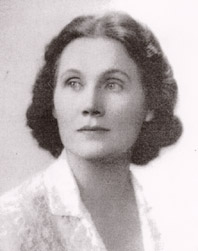Ruth Barrack
It was only a few years after the "gold strike" in Alaska when an adventuresome young lady from Council Bluffs, Iowa, visited her brother Bill Campbell in the "Last Frontier."

Born in Council Bluffs, Iowa, Ruth was the daughter of Scottish parents Alexander
and Mary Ann McKenzie Campbell. After completing her education in Iowa and Nebraska,
she entered the Red Cross service during World War I as a canteen worker in 1918.
At 25 years of age in 1919, en route to Fairbanks, Ruth Campbell endured the hardships
of weather, primitive transportation and lodging as she traveled by boat, railroad
and foot. During many parts of her trip she was the only woman in the group. She was
going to visit her oldest brother, who had been a miner from the early days of Dawson.
On the steamship to Alaska she met a fellow passenger, James Barrack, the owner of
Samson Hardware Company in Fairbanks.

Eventually she arrived in Fairbanks, and that fall, accompanied by a pioneer photographer,
Mrs. Nan Robertson, left by steamer for the Kantishna to take pictures of Mt. McKinley.
After 10 days on the river, they crossed the 30-mile trail to the Quigley mine spending
the next two months with the famous Joe and Fannie Quigley, of whom a number of books
have been written. Ruth then went by dog team through the same pass and route that
the now Mt. McKinley Park road follows. Ruth returned to Seattle, taking 28 days to
make the trip.
Fannie was purportedly fascinated by Ruth—this very genteel, civilized lady—but wanted
no part of either! In the years following, Fannie would often come to see Ruth on
visits to Fairbanks. She would arrive unannounced and bang on the front door, never
using the door bell, and yell, "Kid, where the hell are you?" Dressed in men's clothing
she looked rather witch-like and scared Ruth's daughters to death. Years later a friend
recalled, "whenever there was a terrible commotion at the front door - it was a signal
that 'Fannie is in town!'
In January 1921, she married James E. Barrack, who was interested in many business
ventures, helping to promote many "firsts" in the Interior.

Mrs. Barrack lived in Fairbanks in the true pioneer tradition. She and her husband
helped the city grow and have been active in all charitable drives and organizations.
There isn't any organization in Fairbanks Mrs. Barrack hasn't either helped organize
or served in its development. Besides being a member of the Alaska National Bank Board
from 1960-1970, she was on the board of the Borough Library, as the auditorium of
the Noel Wien Memorial Library was named in her honor, the State Board of the American
Cancer Society and on the Board of Trustees of Alaska Methodist University in Anchorage.
Perhaps Mrs. Barrack is best known for the tremendous amount of work she has done
in the Alaska Crippled Childrens' Association. She has been president of the association
for four years and through the drives and dances they brought in a total of approximately
$10,000 annually. Much of this credit is due to Mrs. Barrack.
In the early 1920's, Mrs. Barrack served the Republican party as a committee woman.
She was also active in the carnival association and participated for a number of years
after it was incorporated.
As a Senior Mother Advisor for the Rainbow Girls, Mrs. Barrack was a great factor
in its beginning and served on the advisory board for three years. She also helped
organize the Parent-Teacher Association and served as the PTA president and secretary.
Other activities included the Eagles Auxiliary, the Soroptimist Club, of which she
is past president and was a delegate to the 1950 convention in Seattle, the Amaranths,
the Gray Ladys, the Episcopal Church, and a life member of the Country Club and social
chairman of the Fairbanks Concert Association.
In 1955 she received the "Far North Press Award" for her philanthropy in encouraging
cultural advancement and higher education in Alaska. She also donated the memorial
carillon on the University of Alaska Fairbanks campus in memory of her husband, James
E. Barrack who died the previous year. Two years later she established a scholarship
in memory of her daughter Barbara, who died of cancer in 1957.
In addition to aiding and helping in many service organizations, Mrs. Barrack found
time to raise three lovely daughters, Bonnie, Beverly, and Barbara, all of whom married
and moved outside. The Barracks saw each of the girls attend college and graduate.
Here is a woman that was sincerely dedicated to Alaska—financially as well as physically—and
to its progress.
Ruth Yvonne Campbell Barrack died in Seattle on February 22, 1980 at the age of 86.
Ruth Barrack is also mentioned in this article
Notable People:James Barrack
Source:
All photos courtesy of Bonnie DeVos
Fairbanks Daily News Miner, February 5, 1953 - Woman of the Week
Western Banker, San Francisco, August, 1970 - Mrs. Ruth Barrack, Director Alaska National
Bank of Fairbanks
Charter Members Pioneers of Alaska Auxiliary #8 January 5, 1948, publication date
1999
